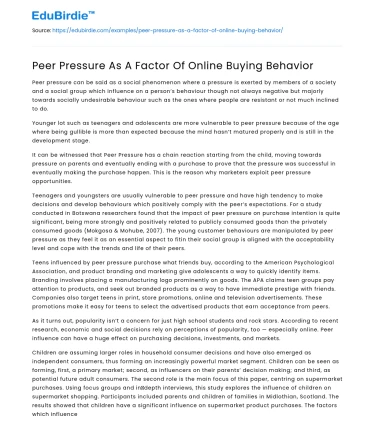Peer pressure can be said as a social phenomenon where a pressure is exerted by members of a society and a social group which influence on a person’s behaviour though not always negative but majorly towards socially undesirable behaviour such as the ones where people are resistant or not much inclined to do.
Younger lot such as teenagers and adolescents are more vulnerable to peer pressure because of the age where being gullible is more than expected because the mind hasn’t matured properly and is still in the development stage.
Save your time!
We can take care of your essay
- Proper editing and formatting
- Free revision, title page, and bibliography
- Flexible prices and money-back guarantee
It can be witnessed that Peer Pressure has a chain reaction starting from the child, moving towards pressure on parents and eventually ending with a purchase to prove that the pressure was successful in eventually making the purchase happen. This is the reason why marketers exploit peer pressure opportunities.
Teenagers and youngsters are usually vulnerable to peer pressure and have high tendency to make decisions and develop behaviours which positively comply with the peer’s expectations. For a study conducted in Botswana researchers found that the impact of peer pressure on purchase intention is quite significant, being more strongly and positively related to publicly consumed goods than the privately consumed goods (Mokgosa & Mohube, 2007). The young customer behaviours are manipulated by peer pressure as they feel it as an essential aspect to fitin their social group is aligned with the acceptability level and cope with the trends and life of their peers.
Teens influenced by peer pressure purchase what friends buy, according to the American Psychological Association, and product branding and marketing give adolescents a way to quickly identify items. Branding involves placing a manufacturing logo prominently on goods. The APA claims teen groups pay attention to products, and seek out branded products as a way to have immediate prestige with friends. Companies also target teens in print, store promotions, online and television advertisements. These promotions make it easy for teens to select the advertised products that earn acceptance from peers.
As it turns out, popularity isn’t a concern for just high school students and rock stars. According to recent research, economic and social decisions rely on perceptions of popularity, too — especially online. Peer influence can have a huge effect on purchasing decisions, investments, and markets.
Children are assuming larger roles in household consumer decisions and have also emerged as independent consumers, thus forming an increasingly powerful market segment. Children can be seen as forming, first, a primary market; second, as influencers on their parents’ decision making; and third, as potential future adult consumers. The second role is the main focus of this paper, centring on supermarket purchases. Using focus groups and in‐depth interviews, this study explores the influence of children on supermarket shopping. Participants included parents and children of families in Midlothian, Scotland. The results showed that children have a significant influence on supermarket product purchases. The factors which influence children's product preferences are analysed, and their ability to relay their choices to their parents is considered.
The way of looking at life may influence you to change for betterment. Some of peers such as close friends, who do not pressurize to do things but rather inspire to change yourself, persuade to bring about a constructive changes in personality. Hence Peer pressure can lead to make the right choices in life, thus can have a positive impact which might enable to change the perception towards being positive as well. When it comes to buying and consumer behavior, it is always perceived that good or bad, the peer pressure imposes an impact which is in the best use of marketers. Where trendy things like Selfie Sticks or branded products such as iPhones, Androids all are getting companies a world time high of sales. Be it commodities inducing addiction, or sexual behavior there is no loss to the enterprises at all. Marketers are neutral to the fact if the perception about peer pressure is positive or not unless, to save their Corporate Image or inculcating Corporate Social Responsibilities.
Nowadays, there is a boom in online purchasing, especially by adolescents. In fact, scholars and marketers alike have long noticed the emergence of adolescent consumers and their consumption behaviors. This research aims at exploring the effect of adolescent decision‐making styles on online purchasing behavior, with peer influence as a moderating variable. An online questionnaire survey was conducted on 2,419 adolescents and further verified by regression analysis and analysis of covariance. Adolescents with planned purchase behaviors can be considered as rational consumers, in that they do not care about fashion, or recreational, hedonistic shopping consciousness, but rather focus on brand, price value, and high quality. Indeed, adolescent purchase decision making can be strengthened by peer influence.






 Stuck on your essay?
Stuck on your essay?

